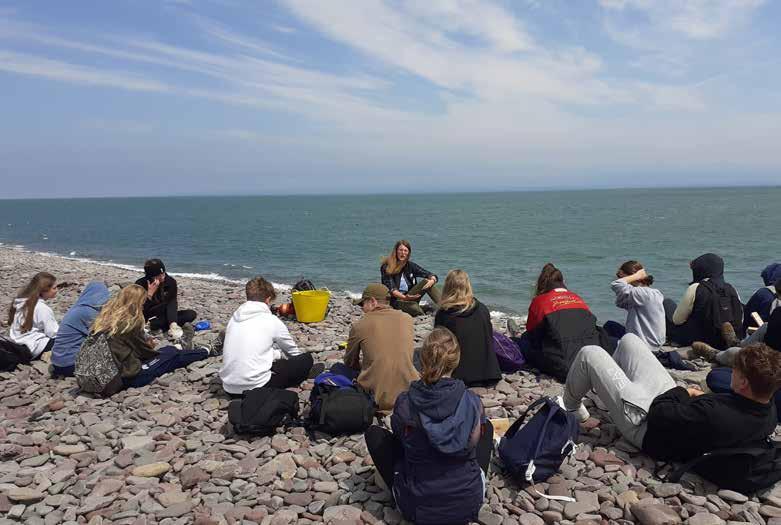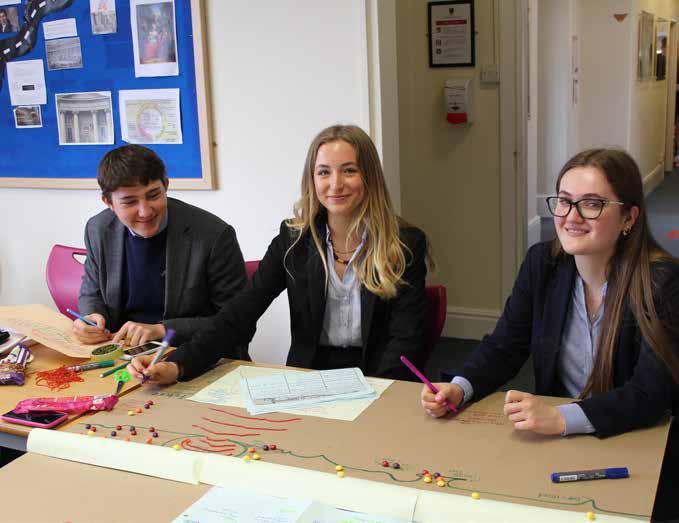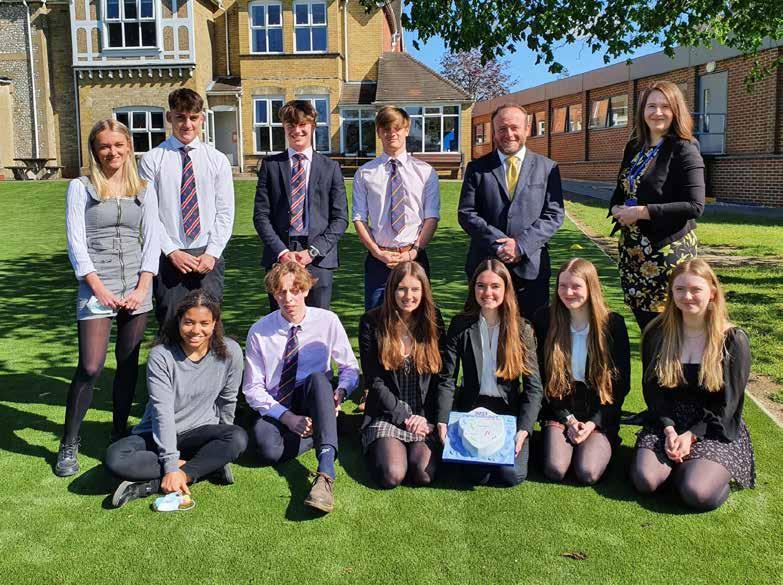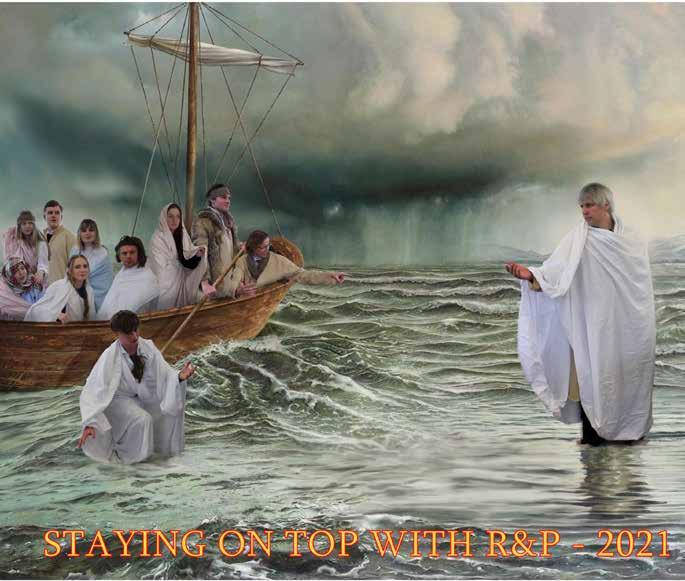
11 minute read
Humanities
Business
They may have been a small group of eight Upper Sixth Business students this year, but they were lively, engaged and enthusiastic. They certainly had a lot to live up to after excellent results in the previous two years, but despite their disrupted Lower Sixth and Upper Sixth years, the Business students performed excellently. Four out of these eight students will study Business or a related degree, such as Marketing, at university.
The 23 Lower Sixth students have been working very hard too, having done especially well during the lockdown period, maintaining their work ethic and willingness to keep progressing through the A Level course content.
GCSE Business was launched this year, too. Our first group of Fourth Year students have embarked on the GCSE course with great commitment; it will be fascinating to see their GCSE results next summer - the first ever Business GCSE results at Churcher’s College.
Mr R West
Classics
The popularity of all Classical subjects remains buoyant at Churcher’s, with interest and numbers high for our whole suite of Classical subjects: Latin, Classical Civilisation, Greek and Ancient History. It has been great to see such enthusiasm and interest throughout the school, despite the circumstances.
Miss Elson has introduced a new Greek Club working towards an Intermediate Certificate in Classical Greek open to all Third and Fourth Year Latinists. It has been great to see such dedication and enthusiasm to learn and also the speed with which they have picked up the language, which shares much of its grammatical base with Latin.
During the Summer Term, the Fifth Year relaxed after their assessments with bridging courses in Latin and Ancient History. We took the opportunity of visiting the Nero exhibition at the British Museum to give some historical context to their set texts and visualise some of the characters and key moments of the Roman empire. On their return, pupils also researched a piece of Latin literature to present to the rest of the class, whilst the Ancient Historians researched objects from the Persian empire.
Our A Level pupils in both Latin and Ancient History have all shown great passion for their subjects, with a few looking to read a Classical subject

at university. We ran a bespoke C2C course on Classics with a module on Greek tragedy, focusing on Euripides’ Bacchae and Sophocles’ Antigone, as well as an introduction to Greek language.
We have also piloted an exciting new Latin course for the Second Years with extra emphasis on the literature and mythology of the Greeks and Romans, but also a stronger focus on grammatical accuracy in the Latin. The course will really help pupils to decide whether Latin or Classical Civilisation is the right option for them in the Third Year.
Mr J Hegan
Economics
2020-21 has been a fascinating year to study Economics with governments around the world using unprecedented tools to support their economies. This has provided a rich source of information for us to use as we moved through the course. It also added an extra dimension during the second period of remote learning when we were studying the economic impacts of the pandemic, while living the social consequences. The determination and resilience our students displayed during this period were fantastic to see.
This year has also been a year of innovation and that was a key theme that Simon French, Chief Economist at Panmure Gordon, talked about in our remote CCALS event in March. This was attended by over hundred people and we were reassured by his upbeat projections for the UK economy. Challenging our students to go above and beyond the A Level remains a key part of our role and I was delighted to see so many students asking Simon some very good questions. It is also great that a large number of our Lower Sixth are hoping to enter the Royal Economic Society’s Young Economist of the Year essay competition, requiring them to research extensively on a specific topic and write an undergraduatestyle essay.
Our students have also had many opportunities to experience Business and Economics outside of the classroom, even during lockdown. Our Tycoon Enterprise teams adapted their businesses for the pandemic with one selling Churcher’s branded facemasks and the other selling bags made out of recycled clothes. Both found online platforms to advertise and sell their products. Sixth Former Alex Lambrianou also received investment from the Peter Jones Foundation for his business ‘Share a Smile’. This is a gifting platform which is aimed to help local
businesses in the pandemic while enabling people to share a smile with their loved ones.
Stuart Chapman from Draper Esprit also innovated to ensure that we were still able to run the annual Dragons’ Den event. We had more than 30 students working as teams in the Lecture Theatre to watch company presentations and then decide where to invest their money. This was a unique opportunity for them to learn about the world of venture capitalism.
Mr M Hill
Geography
At times this year, the continuation of remote and blended learning has seen Geography lessons largely delivered through Microsoft Teams. Re-ordering the programme of study allowed the most remote-friendly units to be delivered under lockdown.
Fieldwork has become more complex with venue restrictions on numbers and bubbles, socially distant seating plans for transport, PPE and wipedown arrangements for shared equipment. Despite all this being in place, both Fifth Year trips were subsequently cancelled - our beach day at Highcliffe due to the arrival of Storm Alex and our day investigating Portsmouth Harbour due to visitor restrictions at Gunwharf. Fortunately, we have access to excellent ICT on site and were able to complete both investigations virtually using Digimap, Google Earth and historic data. In the Autumn Term, the Second Years had better luck with their trip to Marwell Zoo and the Upper Sixth students were able to pilot their NEA data collection techniques at West Wittering and Chichester.
January’s reopening of the classroom brought a welcome return of real faces, admittedly masked, to interact with and to teach. As a school member of the Royal Geographical Society, we were able to invite pupils and parents to an online lecture by best-selling author Tim Marshall on The Power of Geography.
Despite Covid, the Fifth Years and Upper Sixth managed to complete their respective GCSE and A Level courses in full.
In the Summer Term, the Third Years were also prevented from visiting the New Forest, but we were able to get the Lower Sixth to Somerset for their three-day fieldwork skills course and the First Years enjoyed a day in the sunshine at Marwell Zoo, despite the weather warning for rain!
Mr D Nighy
History
This year, Churcher’s historians should have had the pleasure of visiting Berlin, Paris and Ypres, as well as many UK based trips, but it was not to be. Instead, the Department had to innovate with new and exciting ways of delivering our Curriculum remotely.
Remote teaching has led us to some off-piste lessons such as treasure hunts, composing History songs, a multitude of Gimkits and much more. Miss Swindells (now Mrs Butler) has continued with the Covid archive as means of recording these unprecedented times for future generations of Churcher’s students.
Lockdown and remote learning were no hindrance to our thriving CCALS programme, however, and we have held many lectures over this academic year, some live and some virtual. Highlights have included:
• The Holocaust Educational Trust’s lecture to all Fourth Years on
Holocaust Memorial Day, in which 90-year-old Eve Kugler shared her testimony. • CCALS by Claire Brockdorff: The
July Bomb Plot of 1944, providing a personal connection to the plot to kill Hitler. • CCALS by Prof William Doyle:
Could France’s experiment with
Constitutional Monarchy have survived? • CCALS Prof Chris Corin: 1917:
Russia’s Great Lost Opportunity. • CCALS Prof David Andress:
Napoleon: Where Did It All Go
Wrong?
Mr McLearie and Sixth Former Amy Gaisford have created a thriving Lower Sixth History Society. Meeting at lunchtimes, the club looks at key historical figures and debates events beyond the curriculum. Set up to bring history alive, its success is evident in the fact that it attracts non-historians too.
Special mention must go to Third Year Katerina Masic, who was awarded an Honourable Mention in the annual World War One art and poetry competition ‘Never Such Innocence’. Her piece ‘Despair’, featured opposite, deeply impressed the judging panel, who received more than 3,000 entries from 99 countries. Very well done, Katerina!
Mrs H Jolliffe
Politics
The students in the Politics Department have endured all of this year’s upheavals with good humour and spirit – their stoicism and maturity a real source of pride. They stuck to the task of remote working extremely well and became an extremely tightly-knit group during the Spring period of ‘Teams teaching’; adversity breeding something of a siege mentality!
Whilst looking at a screen of black squares does not inspire absolute confidence in their learning, the work they submitted certainly did and, if anything, the students reached new heights while we were away. Apps were the name of the game and getting familiar with Quizlet, Gimkit and all manner of remote gamified learning really stretched the students and gave the opportunity for staff to learn a few new tricks.
Despite the usual CCALS, roundtables and trips being decimated by Covid, we have still managed to fit in a number of online talks, tuning in to Professor Tim Marshall speaking on his latest bestseller The Power of Geography, which proved incredibly useful for the students’ understanding of geopolitical trends in the coming decade.
Students also attended (remotely) a fantastic Congress to Campus talk at the Rothermere American Institute at Oxford University. They had the opportunity to meet and grill

former Republican congressmen and women Ben Chandler and Ann Marie Buerkle. The event also featured Professor Adam Smith, Professor Edward Orsborn from Oxford and Professor Robert Lieberman from Johns Hopkins University. It proved a fascinating insight into the workings of the US’s legislature and a useful point of comparison for their study of the UK’s system.
Whilst there was perhaps less political drama to gorge on than in recent years, the various machinations of Boris Johnson and his inner circle has kept us more than busy. The Government’s response to Covid generated some fascinating classroom debates about the extent and limits of executive power, protection of rights and individual freedoms and the importance of the economy v. that of public health.
Mr P Cheshire
Psychology
As we are now finishing our fifth year of Psychology at Churcher’s, the Department continues to grow and as a result we will soon be a Department of four teachers; it is amazing to think how fast and big Psychology has grown in such a short space of time – it is in fine fettle!
We should have felt ready for another bout of Teams lessons when they struck in January, but you need to get used to not having your class in front of you and experiencing the fizz and buzz of the classroom. Uncertainty abounded, again, and again we asked more of our students; they rose to that challenge wonderfully. They turned their cameras on and, when possible, we tried to lose ourselves in the lesson like we would have done in person. Certainly, none of us will forget the very particular chime of the Teams call! We greatly enjoyed the imaginative, and at times psychologically revealing, backgrounds they adopted in their Teams calls whilst also benefiting from the use of ‘Breakout’ rooms in order to not lose the discursive element of Psychology. We had some excellent trips and events planned (Southampton Uni and Brain Day), but they were Covid-cancelled. After the Covid-related absences of the last 18 months it was lovely to be able to say goodbye to our Upper Sixth in person... and with cake! Students wrote some of their memories of Psychology on a Freudian inspired iceberg, before we all enjoyed a slice of Mrs Clark’s famous cake.
Dr G Glasspool
Religion & Philosophy
‘If I cannot do great things, I will do small things in a great way’, so said Martin Luther King Junior. And so it

was with R&P in terms of Covid and the second lockdown. Although we were unable to offer our usual trips, Mr Lofthouse was unperturbed... instead of our annual visit to Neasden Temple for the Second Years, he took them on a Hajj around Churcher’s College which culminated in his students throwing paper balls at a rubbish bin, symbolising Muslim Hajjis re-enacting Ibrahim denouncing the devil on his way to sacrificing Ishmael.
Our fabulous A Level leavers departed on a high… they left us with a reenactment showing Peter trying to imitate Jesus walking on water. The conveyance, however, of symbolism can be a delicate business, and so it is with this image. The key to understanding the image is to note the dark clouds in the background! In front of the image we have our young brave student attempting to imitate the master (Mr Baker) in writing the perfect essay. It can look so easy, but if you should lose faith and have a wobble when the storm clouds (the final exams) come, thankfully the R&P team is always there ready with a helping hand!
Our Department has expanded in terms of both GCSE numbers and staffing requirements… all have contributed marvellous teaching, each adding their own individual stamp to the Department.
Mr T Ostersen










